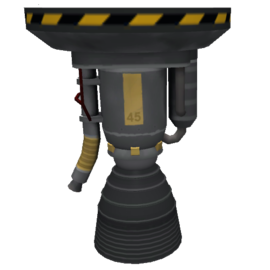Difference between revisions of "LV-T45 "Swivel" Liquid Fuel Engine"
UmbralRaptor (talk | contribs) (→Changes) |
|||
| (49 intermediate revisions by 25 users not shown) | |||
| Line 1: | Line 1: | ||
| − | {{ | + | {{:LV-T45 Liquid Fuel Engine/Box}} |
| − | + | ||
| − | + | The '''LV-T45 "Swivel" Liquid Fuel Engine''' is a basic [[liquid fuel engine]]. It is the first liquid fuel engine available in the [[tech tree]]. | |
| − | + | ||
| − | + | == Product description == | |
| − | + | {{Quote | |
| − | + | |The LV-T45 engine was considered a breakthrough in the LV-T series due to its Thrust Vectoring feature. The LV-T45 can deflect its thrust to aid in craft control. All these added mechanics however, make for a slightly smaller and heavier engine in comparison with other LV-T models. | |
| − | + | |manufacturer=JKJSP | |
| − | {{ | ||
| − | |||
| − | |||
| − | |||
| − | |||
| − | | | ||
}} | }} | ||
| − | |||
| − | |||
== Usage == | == Usage == | ||
| − | + | As a liquid fuel engine, the Swivel has throttle control, shutdown and restart capabilities, making it easier to control vehicles safely and accurately. The Swivel is similar to the [[LV-T30 "Reliant" Liquid Fuel Engine]], but with a slightly smaller thrust chamber, higher expansion ratio, and thrust vector control. Its slightly reduced thrust and considerably increased mass reduces its specific thrust, making it less suitable for first stages. It is best suited in second stages and the core stage of parallel lift-off configurations, where longer operating times and higher altitudes bring out this engine's advantage in specific impulse. | |
| − | + | There are two excellent applications of this engine: in the core stage of parallel booster configurations, where its thrust vector control allows active control of a vehicle powered chiefly by Reliant or [[BACC "Thumper" Solid Fuel Booster]] solid boosters for lift-off, followed by the Swivel engine(s) continuing to operate after the strap-on stages have depleted and separated. And in the second stage of an aerodynamically stabilized booster started aloft using a suitable solid motor stage where the operation of the first stage is controlled by reaction wheels or the first stage burns out prior to the commencement of the gravity turn. | |
| − | == | + | == Trivia == |
| − | + | * Previously, this engine was unlocked after the [[LV-T30 "Reliant" Liquid Fuel Engine]]. The product number and description support the idea of the Swivel being a more advanced version of the Reliant. | |
| − | + | * It is similar in appearance to the RS-56-OSA core sustainer engine used by the late [https://en.wikipedia.org/wiki/Atlas_II Atlas II] rocket. | |
| − | |||
== Changes == | == Changes == | ||
| − | + | ;[[1.12.2]] | |
| − | ; | + | * New model |
| − | * | + | ;[[1.2]] |
| + | * Atmospheric Isp decreased from 270 to 250. | ||
| + | * Thrust increased from 200 to 215. | ||
| + | ;[[1.0]] | ||
| + | * Isp decreased from 370 s (vacuum) / 320 s (1 atm) to 320 s (vacuum) / 270 s (1 atm) | ||
| + | * Gimbal range increased from 1° to 3° | ||
| + | * Cost increased from 950 to 1200 | ||
| + | ;[[0.22]] | ||
| + | * Electricity production increased to 6.0 | ||
| + | ;[[0.18]] | ||
| + | [[File:LTV45.png|thumb|right|Pre-0.18 appearance]] | ||
| + | * New model and texture | ||
| + | * Alternator added, engine now gains 1.0 electricity | ||
| + | ;[[0.16]] | ||
| + | * Major CFG revision (most notably Isp added) | ||
| + | ;[[0.12]] | ||
| + | * Initial Release | ||
{{Parts}} | {{Parts}} | ||
| + | [[Category:Demo parts]] | ||
| + | [[Category:Liquid fuel engines]] | ||
Latest revision as of 03:00, 18 September 2021
| LV-T45 "Swivel" Liquid Fuel Engine | ||
| Liquid fuel engine by Jebediah Kerman's Junkyard and Spacecraft Parts Co | ||
| Radial size | Small | |
| Cost | (total) | 1 200.00 |
| Mass | (total) | 1.500 t |
| Drag | 0.2 | |
| Max. Temp. | 2000 K | |
| Impact Tolerance | 7 m/s | |
| Research | | |
| Unlock cost | 3 500 | |
| Since version | 0.12 | |
| Part configuration | liquidEngineLV-T45_v2.cfg | |
| Maximum thrust | (1 atm) | 167.97 kN |
| (vacuum) | 215.00 kN | |
| Isp | (1 atm) | 250 s |
| (vacuum) | 320 s | |
| Fuel consumption | 13.70 | |
| Thrust vectoring | 3 ° | |
| Electricity generated | 6.0 ⚡/s | |
| Testing Environments | ||
| On the surface | Yes | |
| In the ocean | Yes | |
| On the launchpad | Yes | |
| In the atmosphere | Yes | |
| Sub-orbital | Yes | |
| In an orbit | Yes | |
| On an escape | Yes | |
| Docked | No | |
| Test by staging | Yes | |
| Manually testable | Yes | |
| Packed volume | None | |
The LV-T45 "Swivel" Liquid Fuel Engine is a basic liquid fuel engine. It is the first liquid fuel engine available in the tech tree.
Contents
Product description
| “ | The LV-T45 engine was considered a breakthrough in the LV-T series due to its Thrust Vectoring feature. The LV-T45 can deflect its thrust to aid in craft control. All these added mechanics however, make for a slightly smaller and heavier engine in comparison with other LV-T models. — Jebediah Kerman's Junkyard and Spacecraft Parts Co |
” |
Usage
As a liquid fuel engine, the Swivel has throttle control, shutdown and restart capabilities, making it easier to control vehicles safely and accurately. The Swivel is similar to the LV-T30 "Reliant" Liquid Fuel Engine, but with a slightly smaller thrust chamber, higher expansion ratio, and thrust vector control. Its slightly reduced thrust and considerably increased mass reduces its specific thrust, making it less suitable for first stages. It is best suited in second stages and the core stage of parallel lift-off configurations, where longer operating times and higher altitudes bring out this engine's advantage in specific impulse.
There are two excellent applications of this engine: in the core stage of parallel booster configurations, where its thrust vector control allows active control of a vehicle powered chiefly by Reliant or BACC "Thumper" Solid Fuel Booster solid boosters for lift-off, followed by the Swivel engine(s) continuing to operate after the strap-on stages have depleted and separated. And in the second stage of an aerodynamically stabilized booster started aloft using a suitable solid motor stage where the operation of the first stage is controlled by reaction wheels or the first stage burns out prior to the commencement of the gravity turn.
Trivia
- Previously, this engine was unlocked after the LV-T30 "Reliant" Liquid Fuel Engine. The product number and description support the idea of the Swivel being a more advanced version of the Reliant.
- It is similar in appearance to the RS-56-OSA core sustainer engine used by the late Atlas II rocket.
Changes
- New model
- Atmospheric Isp decreased from 270 to 250.
- Thrust increased from 200 to 215.
- Isp decreased from 370 s (vacuum) / 320 s (1 atm) to 320 s (vacuum) / 270 s (1 atm)
- Gimbal range increased from 1° to 3°
- Cost increased from 950 to 1200
- Electricity production increased to 6.0
- New model and texture
- Alternator added, engine now gains 1.0 electricity
- Major CFG revision (most notably Isp added)
- Initial Release

